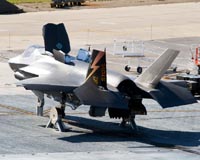| . |  |
. |
Moscow (RIA Novosti) Mar 10, 2010 Russia will complete the construction of chemical weapon destruction plants in 2011 and will destroy all chemical weapons stockpiles by 2012, a government official said on Wednesday. Russia signed the Chemical Weapons Convention banning the development, production, stockpiling, transfer, and use of chemical arms in 1993, and ratified it in 1997. The country has destroyed 18,000 metric tons, or 45% of its chemical weapons stockpiles as of December 2009. Gen. Nikolai Abroskin, head of the Federal Agency for Special Construction, said during a collegiate meeting at the agency that despite the recent financial crunch Russia would meet its obligations and destroy the remaining 22,000 metric tons of chemical weapons by 2012. The country has allocated $7.18 billion from the federal budget for the implementation of the program, and has so far built five chemical weapon destruction plants - in Gorny (Saratov Region), Kambarka (Republic of Udmurtia), Nizhny Novgorod, the Maradykovo complex (Kirov Region), and Siberia's Kurgan Region. Another two are under construction. Abroskin said the completion of chemical weapon destruction facilities remained a priority in 2010. "We should be able to launch the first stage of the facility in Pochep [Bryansk Region], and second stages of the facilities in Leonidovka [Penza Region] and Shchuchiye [Kurgan Region]...which will allow us to finish the construction of all chemical weapon destruction plants in 2011 and destroy all chemical weapons by 2012 in line with the federal program," he said. By 2016-2017, Russia aims to finish all the remaining work under the project, including decontamination and equipment dismantlement, the official said.
Source: RIA Novosti.
Share This Article With Planet Earth
Related Links - The latest in Military Technology for the 21st century at SpaceWar.com
 Two-year F-35 production delay hits Israel
Two-year F-35 production delay hits IsraelTel Aviv, Israel (UPI) Mar 5, 2009 The two-year delay in the production of Lockheed Martin's F-35 Joint Strike Fighter and the cost increase this will entail could jeopardize a crucial deal with Israel for 75 of the stealthy fifth-generation fighter. The Israeli air force wants the aircraft as quickly as possible - providing the price is right - to counter the military threat it believes Iran poses through its alleged ... read more |
|
| The content herein, unless otherwise known to be public domain, are Copyright 1995-2010 - SpaceDaily. AFP and UPI Wire Stories are copyright Agence France-Presse and United Press International. ESA Portal Reports are copyright European Space Agency. All NASA sourced material is public domain. Additional copyrights may apply in whole or part to other bona fide parties. Advertising does not imply endorsement,agreement or approval of any opinions, statements or information provided by SpaceDaily on any Web page published or hosted by SpaceDaily. Privacy Statement |